Peter MALONE
Saturday, 18 September 2021 19:55
Paul Blart, Mall Cop
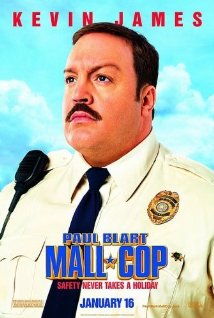
PAUL BLART: MALL COP
US, 2009, 91 minutes, Colour.
Kevin James, Keir O' Donnell, Jayma Mays, Raini Rodriguez, Shirley Knight, Peter Gerety, Bobby Cannavale.
Directed by Steve Carr.
Who is Paul Blart? And how has be persuaded Americans to part with over $100,000,000 in a few weeks to come to see him? What is his appeal?
If one were to answer that Paul Blart is a short, weighty, bumbling mall security guard, hypoglycemic, who failed police academy training but who is terribly conscientious and works by the book, it would be true but would not answer the question. We get nearer an answer when we note that he is played by Kevin James the star of the popular TV show, The King of Queens, who has appeared in some films like Hitch with Will Smith and several Adam Sandler comedies. Here he is launching out on his own (in a film produced by Sandler's company) to test whether he can sustain a star role and entertain people. It looks as though he has succeeded.
One of Kevin James' advantages on screen, with his serious demeanour (though he does a pretty versatile drunk scene when he has imbibed unwittingly) is that he is basically very likeable and, as the film proceeds, is really a gentleman with more than a touch of sensitivity and sweetness. The female audience, like the heroine, Amy (Jayma Mays), will warm to him.
And the male audience? Yes. Anyone who really doesn't look like Brad Pitt or, from another Twilight generation, Robert Pattinson (that really being all of us) can identify with him in his hopes, his loneliness, his tentative courting, his doing a job which is down to earth (even if he overdoes the policing) – and his capacity for filling his emotional voids with food. But, he is a decent man.
Just when we might be wondering where this is going and whether we are going to spend ninety minutes at the mall, securing customer safety and training his dumb apprentice, or at home with Paul's mother and daughter, a Die Hard plot comes to the rescue and the mall is under siege (with a surprise leader). We knew that Bruce Willis could save the day (as he has done in many days and movies later) but, Paul Blart?
The screenplay, which has some good moments of humour (check the security boss and his notebook of hopefully cutting rispostes to the overbearing SWAT leader), is smart enough to know that credibility is strained if the hero overcomes armed and athletic opponents with a series of accidents. This time, Paul keeps telling himself to think and uses his wits, his rules and a range of mall equipment for sale to vanquish. Since we identify with him in his ordinariness, we can pat ourselves on the back to think that, maybe, we could do something like this if we found ourselves in such a situation. It's the dreams of the movies, but pleasant PG-rated, family friendly entertainment this time.
Many people will see it in a mall multiplex and should feel nicely at home. Kevin James has done a good job. He resumed it in the sequel in 2015.
1. A popular film, popular at the box office? Comic and entertaining?
2. Kevin James, his screen presence, his career? Lock, manner, communication?
3. At home, with his mother and daughter? Establishing him as a character? His trying to join the police, failing exams? His work, at the mall? Security, helping people? The later part of the film turning into a variation on Die Hard?
4. Locations, New Jersey, ordinariness, the moall, Amy and work? The details of life in the mall? The problems?
5. Paul and his offsider, Veck, seemingly awkward, learning, involved in the security work?
6. Amy, work, the shop, the attraction to Paul, the touch of the comic romance?
7. Slapstick comedy, pratfalls, the stunts?
8. Paul as a character, his size, image, behaviour, failures, eating, his medical situation? His relationship with his mother, care for his daughter?
9. The supporting characters, ordinary types, audiences identifying with them?
10. The police, the characters, Paul and his interactions?
11. The crisis, the men attacking, masks, the siege, Paul inside, with Amy and his daughter? His being able to inform the police from inside? The accidents, stumbling, winning at the end?
12. The revelation that his associate was behind the attack, the motivation, his crew?
13. All happy at the end, with Amy, with his daughter, with his mother? The award for his work? And the humorous sequences in the final credits?
Published in Movie Reviews
Published in
Movie Reviews
Tagged under
Saturday, 18 September 2021 19:55
Requiescant/ Kill and Pray
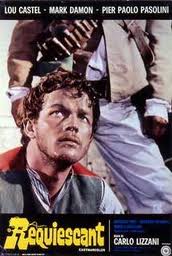
REQUIESCANT/KILL AND PRAY
Italy, 1967, 94 minutes, Colour.
Luke Castel, Mark Damon, Pier Paolo Pasolini, Barbara Frey, Franco Citti, Ninetto Davoli.
Directed by Carlo Lizzani.
There are many reasons for watching this spaghetti Western, an above average example of the genre, coming at the time of the films of Sergio Leone. Carlo Lizzani had been directing and writing film since the 1950s, winning awards, and was to continue right through into the 21st century.
The subject contains familiar material, Mexicans suppressed by an aristocratic and ruthless American called Ferguson (Mark Damon) who initially mows down Mexicans that he had promised land to with machine guns. The focus of the film is a boy who was rescued, his father was killed in the massacre, he grows up with a travelling family and when the daughter is abducted, decides to go to her rescue. The family is devout, the father giving the young boy a Bible (which saves his life when a bullet penetrated instead of him). The boy discovers he is very quick on the draw.
He tracks down the girl and finds that she is being used as a prostitute. This leads to many confrontations, especially with Ferguson’s henchman, culminating in a deadly game with a noose.
The screenplay is very strong about social justice and the oppressed. Mark Damon makes Ferguson rather more interesting, a man of the South with polished good manners, a philosophy of honour even as he ruthlessly imposes on everyone.
However, this is a film with Pier Paolo Pasolini.
One learns something new every day. Pier Paolo Pasolini in a spaghetti Western? Contributing to the writing of a spaghetti Western? Acting as a priest in a spaghetti Western? All true.
The title is religious, Latin for “Rest in peace” and is quoted a number of times. It is an above-average contribution to the genre, from a veteran writer and director whose career spanned 60 years. Pasolini has third billing as Fray Juan. He does not make his major appearance until the latter part of the film. Pasolini appearing as a friar, wearing a poncho with stubble over his shoulders, is certainly a surprise but there is a quote from Pasolini in 1966 commenting on how people say he is an atheist. He says that if they described him like this, they don’t really know him. He might be an atheist but he has a nostalgia for belief.
Juan is a pacifist but is the moral leader of a group of rebels, Mexicans at the time of Villa who have been oppressed by an aristocratic American landowner, Ferguson (Mark Damon), who has massacred Mexicans, including the father of the hero, Requiescant (Lou Castel). When the friar arrives with his troop, he explains that he admired Requiescant’s reforming father, that he acted as a guide for the peace for the poor Mexicans, and that the Bible would bring freedom. While he proclaims that ideas need to be changed rather than cattle and property, he commissions Requiescant to be their leader.
During the showdown, the friar appears with a group of Mexican musicians and a singer, observing Requeiscant and his vengeance. Someone explains Juan’s background, the son of a peon father, sent as a servant to a rich man who educated him, was taught to fight but did not use a gun, did not want to use a gun. “War is evil and we pray that it not curse our home.” After the shootout, he tells Requiescant that war can be evil for good men, that war destroys pity, that while Ferguson was not Requiescant’s enemy, he was the enemy of the people. He tells Requiescant that he had enjoyed his vengeance. Yet, he realises that the Mexicans need men like Requiescant but he prays that the Lord will lead him.
When the huge church bell falls on the hole into which Ferguson has fallen, the friar leaves, advocating justice and freedom, “adios con Dio”.
With its social concerns, the story must have appealed to Pasolini and his ideas and ideals so that in the period that he was making Oedipo Re and Teorema, he would spend time with this project. His forthright friar is one of the strongest priests in spaghetti Westerns, spanning the violence in the uprisings and the Gospel message of peace.
1. The popularity of spaghetti Westerns in the 1960s? The visual style, tough, heightened? The locations, standing in for the West, the countryside, the desert, the villages? The score and its being atmospheric?
2. The work of the director, his wide range of films, writing and directing? Many genres?
3. The title, the focus on the character of Requiescant, his name? The alternate, Kill and Pray? The Italian perspective? The priest, In God we Trust? The Italian Catholicism to Hispanic settings?
4. The initial massacre, Ferguson and his supervising, the alleged treaty with the people, then the killings? The boy being rescued, the pleasant family, the domestic scenes, going further West, the terrain, the snow? The boy growing up? The girl? Her disappearance, wanting to go with the players? The father, reading the Bible, devout, the boy going to search for the girl, taking his Bible?
5. The outlaws, the stagecoach, the robbery, the gun, riding away? The hospitality, the brothers, the shootout, the stagecoach? The boy in pursuit? The frying pan for his horse?
6. The episodes in the West, the burying of bodies, not having pistols, the saloon, fighting the girl, her being held by Ferguson and his gang? The men in the gang – and their participation in the initial massacre?
7. The table, Ferguson as a character, his pretences to aristocracy, strength? The issues of the Civil War, Lee versus Grant? Ferguson and the old South, the slavery, his observations about slavery?
8. Ferguson as a character, his manner of speaking, dress, his wife and treatment of her? Expectations of her, dignity?
9. The girl, the shooting of the bread, the tough attitudes? Requiescant and his eye for shooting?
10. Ferguson, the discussion about Brothers in the Lord, the drinking competition, the beating up of the girl?
11. Requiescant, his name, quoting the Latin? Nothing in scripture against wine? His skill in shooting, accuracy?
12. The saloon, the prostitutes, the pills, the piano? Dean and his bond with Ferguson? His brutality?
13. The memories of the massacre, the bald friend, the deaths? Requiescant taken, the water torture, Ferguson and his wife, memories of the massacre, Dean of the confrontation?
14. The Mexicans, Requiescant, the Bible being shot and his life saved? The rebel group? Their arrival?
15. Fray Juan, with Requiescant’s father, under the leadership of Villa, the explanation of the qualities of his father? Fra Juan, a guide, peace with the Americans, the Bible bringing freedom? The confrontation with Ferguson? The importance of changing ideas rather than cattle and possessions, the need to
change? The commission Requiescant? His leadership?
16. Juan with the musicians, Dean and the girl, the drinking? The game with the noose? The clock ticking? The close-up of eyes? Dean and his death? The Scriptures on give and take?
17. Juan saying that Requiescant was the leader, alone, his achievement and then Juan rebuking him, saying that he enjoyed the vengeance, but that was not the right way?
18. The buildup to the confrontation with Ferguson, the fight, the dynamite? Ferguson wanting an aristocratic death? His theme of honour?
19. The success of the revolution, the Mexicans, the brutal Americans, order restored?
20. A different spaghetti Western?
Published in Movie Reviews
Published in
Movie Reviews
Tagged under
Saturday, 18 September 2021 19:55
Boychoir
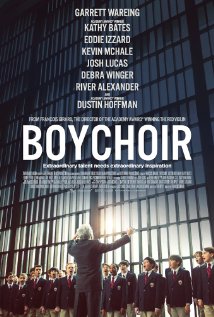
BOYCHOIR
US, 2014, 103 minutes, Colour.
Dustin Hoffman, Garrett Wareing, Kevin Mc Hale, Eddie Izzard, Kathy Bates, Josh Lucas, Debra Winger, Joe West.
Directed by François Girard.
Remembering a film about a child and music, August Rush, from 2007, I glanced at my review at the time and it struck a chord (so to speak) for the response to Boychoir. Here it is, ‘If you are a reader of reviews by the more ‘serious’ critics, you will find a rather universal dismissal of this film as far too emotional and sentimental. If you are a reader of reviews which try to communicate with the general audience, you will find the film praised for its entertainment and values – and the admission that it is unashamedly emotional and full of sentiment. It was W. Somerset Maugham who remarked that sentimentality is only the sentiment you disapprove of.’
Stet is an 11-year-old living in Texas. He is an angry boy, often smouldering, lashing out physically, problems at school, although the principal of the school (Debra Winger) knows that he has a singing talent and invites the American Boychoir to visit the school so that Stet can audition. He interprets things wrongly and runs out.
Meanwhile at home, his mother is alcoholic, a pill-taker, unmarried, her life is a wreck. Within some minutes, she is literally in a wreck and dies. Stet is emotional at the funeral but can’t bring himself to go to the grave. His father (Josh Lucas) turns up, having never seen his son but who has supplied finance for his upkeep and education. Stet is the result of a casual affair.
The father takes his son to the Boychoir school, assuming that he will get in, but the administration is reluctant, especially the Master Conductor (Dustin Hoffman) who remembers Stet running out of the audition. Sometimes a big cheque helps and Stet is accepted to the school.
As might be expected, he does not fit in with many of the boys, or with some of the staff, getting himself into quarrels, lacking discipline which the Conductor interprets as lack of respect. However, everybody recognises that Stet has a special gift in his voice.
The screenplay is more or less predictable, and while there are no great surprises, sympathetic audiences will want to follow Stet’s development in the school, relating with the boys, academic studies, sport, music theory, music practice. The audience does get a good idea of what this kind of music education entails.
For music lovers, there is quite a range of music, a range of pieces for individuals and for the choir, from Faure to Benjamin Britten. The choir, with rival eyes on The Vienna Boys Choir, wants to be accepted to sing in New York City. When they get the opportunity, because of Stet and his voice (a performance that was almost sabotaged by a jealous boy stealing his score), the choice is Handel’s Messiah, with his alleluia chorus and the soloist having to reach and sustain a very high note. Will the boy, analytic in his approach to singing, gain the day or will the more instinctive Stet be chosen?
In the background, there is also the situation with Stet’s father, his not having told his family the truth, there being some tickets to a concert sent anonymously to the family, the father wanting to send his son to a school in Switzerland, and a solution, happily, for the benefit of Stet.
The film has been directed by Canadian, François Girard, whose films included 32 Variations by Glenn Gould and The Red Violin.
Audiences will enjoy seeing Dustin Hoffman, a touch irascible, as the conductor of the choir, very demanding, with very little back story until a final conversation with Stet, a story of frustration and disappointment. Eddie Vizard is Drake, in waiting to take over from Dustin Hoffman, a perfectionist, sometimes pedantic, with favourites. Kevin McHale? is the very young and sympathetic teacher who supports Stet. And, as always, and enjoyable performance from Kathy Bates as the administrator of the school, and she gets a couple of very telling speeches and delivers them with great gusto.
The film introduces a Garrett Wareing as Stet. He is quite persuasive, as the angry boy, not always sympathetic, finding his way in the school, realising his great desire to sing but having to overcome anger and antagonisms.
When the school emphasises that Handel’s Messiah is a crowd-please, we realise that this is what this film intends to be, a crowd-pleaser about music, song, boy choir voices (which sooner or later will break) and, as the final song during the credits reminds us, the mystery of the gift.
1. The appeal of the film? Wide audience? Song, music, voices, performance? Education and training?
2. The title, the choir contributing to the soundtrack?
3. Boy choirs around the world, rivalry? The boys, the gift, for a limited time, treasuring it, using it, the transition, their future?
4. The choir, the school, the staff, administration, teaching and tutoring? The range of boys? Auditions, their talent, the requirements, schooling, academic, sport, music, theory and practice? The effect at this age of a life? Concerts, school visits, international tours?
5. The score, the selection of pieces, song, the range? The Messiah?
6. Stet and his story, at school, the interest of the principal, his anger and fighting? His mother, sleep, drinking, her pills? Her death in the accident? Her funeral, Stet keeping a distance, his father arriving?
7. The father, Stet as his secret child, financially supporting him, yet no connection? The background of the affair? His family, wife and daughters? His having to face the reality at the funeral? Taking him to the choir school? The interview, the cheque, the reaction of the administration, Justine taking it? Carvelle and sending the tickets for the concert? The family coming? The father going to the recital of the Messiah? Wanting his son to go to a Swiss school? Carvelle and his standing his ground, keeping the secret so that Stet could remain? Telling his wife the truth at the end? The coming to welcome him into the family?
8. Carvelle, conductor, irascible, coming to the school, the urging of the principal to listen to’s debt, Stet running away?
9. Stet going to the school, his room, roommate, the sound system, the clash with the other boys? The effect of the education on him? Wanting to sing? Unable to read music? The strong voice, the episodes of singing, the audition? Justine and her interest?
10. Carvelle, tough, watching the time, wanting respect? Drake and his meticulous approach, critical, in waiting for the top job? Wooly, young, talented, humane? Justine and her administration, exasperation, interest in the success of the school?
11. Devon is the star singer, solutions, his performance, going to Japan, Carvelle fostering the rivalry with Stet? Devon, analytical, cold, malicious, the flu, taking the copy of the music, stranding Stet? Stealing the documents, the copies about Stet’s mother and her prison photo? The final fight?
12. The other boys, some friendly, some not, the range of classes, the knowledge required, musical theory, skills, the boy helping Stet to read music?
13. Carvelle, the glimpse of his personal life, a hard man, the revelation of his past, Julliard, being failed, punching his tutor? His response to Stet, the demands, Stet and his anger, breaking the window?
14. Stet and his change, saying he wanted to sing, Christmas holiday by himself, staying, getting the food, practising singing for the audition? His singing, seeming to fail, anger? Yet finding his uniform on his bed?
15. New York, the concert, Devon taking the pages, the success of his singing, the aftermath, not wanting to fight Devon?
16. Devon, the document, distributing the copies, the dining room, the photos on the wall, Stet and his fight?
17. Stet meeting Carvelle, the chapel, his acknowledging that there would be the meeting?
18. The meeting, Justine presiding, strong words in exasperation? The arguments? Carvelle voting for expelling Stet – as long as Devon was expelled? His
knowing the truth? Offering his resignation? Justine and her demands?
19. The choir going ahead with the Messiah, the choice for singing the high note, each of the boys auditioned, practising? Stet performing? Success?
20. The aftermath, his voice breaking, questions about being an alto? His father taking him to a new school, his wife arriving, the children, welcoming him?
Published in Movie Reviews
Published in
Movie Reviews
Tagged under
Saturday, 18 September 2021 19:55
Paul Blart, Mall Cop 2
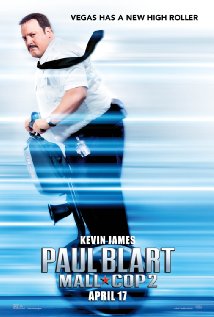
PAUL BLART, MALL COP 2
US, 2015, 94 minutes, Colour.
Kevin James, Raini Rodriguez, Eduardo Verastegui, Daniella Alonzo, Neal Mc Donagh.
Directed by Andy Fickman.
If you saw the original film, Paul Blart, Mall Cop and enjoyed it, then this is certainly a film for you. It is not a film for highbrow critics who may consider it below their dignity. In fact, it is a light comedy, for passing enjoyment rather than for posterity, some slapstick, some comic situations and lines, the overcoming of villains and heroism for the little guy (metaphorically, because Kevin James is a rather large!).
Kevin James established himself as a comedian, working in stand-up comedy and clubs, moving to television, moving to movies, especially with Adam Sandler whose company has produced this film. He portrays the large man and his attempts at extroverted ego cover a diffident self-image. However, he has found his place of life, working as security man, mall-cop, ever ready to help, communicating with the mall shoppers, even when he does mess-up a lot of things.
At the opening, he marries again, his wife leaving, divorcing after six days. His mother, a glimpse of Shirley Knight, is almost immediately knocked over by the truck, leaving himself and his daughter at home. She, secretly, wants to go to UCLA to study and has been accepted but can’t face telling her father.
So, where is the screenplay to go from here – Las Vegas.
There is a conference of mall-cops and Paul is delighted to go, throwing his weight around when he arrives, with the bus boy, to whom his daughter is immediately attracted, to the man at reception, to the manager of the hotel whom he rather crassly insists is coming on to him. He is advised that he is to give the keynote speech but his colleagues soon disabuse him of that prospect. So, just to be there, with old friends, hang out with them and enjoy the visit.
So, where is the screenplay to go from here – have some arch criminals arrive at the hotel with a plan to steal the paintings, including Van Gogh, some statuary, substituting fakes, and storing everything downstairs to be sold to the highest bidders.
Bring everything together, including the daughter and the bus boy and the criminals, pursued by them and held hostage. In the meantime, the keynote speaker collapses and Paul has to take his place – and, in his earnest speech, he has the ears and tears of all the participants, including the manager standing at the back, and receives thunderous applause.
Back to the criminals, their plans, the crew, the smart execution of stealing, Paul trying to phone his daughter and she him, and then his going into action, the rather hefty man outwitting the arch-criminal and his associates. Of course, this means plenty of comics situations, quite a lot of tasering, people going into swimming pools, and the final confrontation when Paul seems outwitted and outflanked only for his security associates to come and win the day.
And he realises he has been selfish and his daughter is to go to UCLA.
It is mainly a happy ending, although the trailer has a final sequence where Paul flirts with a policewoman on a horse, is given her number, pats the horse who does an enormous back-kick landing Paul across the road. It is that kind of film, geared for a family audience, not a swear word in earshot, something of a slapstick and humorous line comedy.
1. The popularity of the first film? The wide audience? Comedy, Paul as a character, Kevin James? Sequel? The scenes at home, at the mall, Paul Blart in action? Las Vegas, the views, the casinos, the interiors, action? Reception, the rooms, the luxury apartments, the criminals, the corridors? The pools and patios? The audience at home with this kind of setting?
2. Kevin James, his comic style, the large man, the touch of ignorant arrogance, a good heart, in action, interactions with people in the mall, his daughter unable to tell him that she had been accepted to UCLA?
3. Going to Las Vegas, Paul for himself, the flight, wanting attention? The news that he was to make the speech? With his friends, hanging out with them, drinking, the chat, the rivals? His daughter and her seeing the busboy, attracted to him, their meeting? Reception, the reactions? The manager, his attitude towards her, interpreting that she was coming on to him, her continued visits and trying to explain the truth – the moisture on her lip, her being interested in him? The security man, rivalling Paul, his seeming sinister?
4. Paul, the variety of slapstick, many faux pas, his friends, each of the characters, eccentricity, the experts, the champions, the friend falling asleep, the enthusiastic wife? The drinks, his being knocked out from his speech? Paul having to step in, the earnestness of his speech, the response of the audience, tears, applause? The manager and her being drawn in?
5. The villain, his manner, odd? The large crew, and the bodyguards, the security people, the contact within the hotel staff? The aim, the paintings and statues, substitutions, seeing them in action, storage downstairs, the cartons for transfer?
6. The party, in the celebrity room, the daughter and the bus boy, caught by the criminals, attempting to flee, taken hostage, handling the situation, the phone, the calls, Paul and his being upset with his daughter after finding the university acceptance?
7. Paul and his mission, getting the help of his friends, the chases, the taser hits, the verbal confrontations?
8. The daughter, her character, with the boy, Paul finding her letter, upset, being too tough on her?
9. The confrontation, substitutions and paintings, plots, dangers, the friends coming to the rescue?
10. The manager and Paul urging her to go to the security guard?
11. Paul as a hero again, award, allowing his daughter going to UCLA – and the joke of flirting with the policewoman on the horse, patting the horse and the
kick?
12. A family oriented comedy?
Published in Movie Reviews
Published in
Movie Reviews
Tagged under
Saturday, 18 September 2021 19:55
To the Last Man
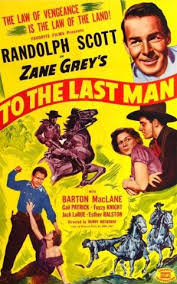
TO THE LAST MAN
US, 1933, 74 minutes, Black and white.
Randolph Scott, Esther Ralston, Jack La Rue, Buster Crabbe, Barton Mac Lane, Noah Beery, Gail Patrick.
Directed by Henry Hathaway.
To the Last Man is based on a Zane Grey story. It is an early film director Henry Hathaway (36 years later he directed John Wayne to an Oscar for True Grit) and had a very successful career during the 1940s, 1950s, 1960s.
This is also an early film for Randolph Scott, who does not ride into the story until almost 20 minutes have passed. The film takes place at the end of the Civil War, family feuds and murders in Kentucky. When the law imprisons the patriarch of a family, Colby (Noah Beery) for 15 years, he wants revenge and pursues the Hayden family to Nevada, stealing their cattle, preparing for the confrontation. He is assisted by a sinister friend from prison, Jack La Rue.
On his way home, Randolph Scott encounters Ellen Colby (Esther Ralston) and they fall in love, not without some clashes, not without her father confronting her, but her standing her ground and, ultimately, uniting the two families in peace.
In the meantime there have been quite a number of fights and shootouts. Uncredited is a supporting role from John Carradine and, for those not in the know, it will be a surprise to find five-year-old Shirley Temple as the granddaughter in the family.
1. The popularity of Civil War stories in the 1930s? Film versions?
2. The basic production values, echoes of the silent period? Some stilted performances? The film going into action after the early sequences and becoming interesting?
3. Black-and-white photography, captions, the names of the characters during the action, style of the time? Musical score?
4. The title, the indication of feuding families, killings not being murder but the result of feuds? Families becoming involved, vengeance, killings, shootouts?
5. The end of the Civil War, the little boy and his grandfather, hunting, Colby shooting the grandfather? The vengeance of the grandmother, eye for an eye? The father, his decision to go to the law, the lawyer early warning about feuds, Colby sentenced to 15 years?
6. The Hayden family, migrating to Nevada, building up their ranch? The sons and the daughter growing order? Marriages, children? The peaceful life?
7. Colby, getting out of prison, his work with Daggis, tracking down the family, the moving to Nevada, the stealing of the cattle? Daggis and his work with Colby, yet intent to betray him?
8. The life of the family, the different generations, work, the children?
9. Lynn, riding, the encounter with Ellen, the swimming, Daggis and his roping him? The friendship between the two, the discovery of the families, Ellen and her harsh reaction? Lynn and his bringing the gift of the dress? Ellen and her wanting to be a lady? Her relenting about Lynn? The meetings?
10. Colby, the plan for the confrontation? Daggis and his henchmen, the dynamite in the hills?
11. Colby and his men riding to the Hayden ranch? Everybody prepared to fight? The little boy rescuing the dogs? Little girl sitting outside and the shot? Bill and his being taken, tied, dead on his horse?
12. Lynn and the others, and the women, all shooting? Following the group, into the hills, the dynamite, the avalanche? Lynn surviving? The top of the mountain, Daggisd and his killing Colby?
13. Lynn surviving, meeting with Ellen, his being wounded, Daggis and his confronting Ellen, planned marriage? Lynn falling on him with a knife? The final photos of the happy couple at the end?
Published in Movie Reviews
Published in
Movie Reviews
Tagged under
Saturday, 18 September 2021 19:55
Spoliers, The/ 1943
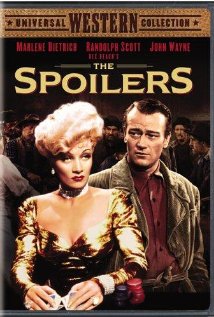
THE SPOILERS
US, 1942, 87 minutes, Black and white.
Marlene Dietrich, Randolph Scott, John Wayne, Margaret Lindsay, Harry Carey, Richard Barthelmass, Samuel S. Hinds, Marietta Canty, Charles Halton.
Directed by Ray Enright.
The Spoilers is based on a novel by Rex Beach who also wrote The World in his Arms. It had been filmed in silent times, soon after the events in the story. This 1942 version was made only 40 years after the events. It is a story of Alaska, a frontier, gold seekers and corrupt officials.
The film was a star vehicle for Marlene Dietrich who had made such an impact in 1929 in Germany in The Blue Angel. She soon went to the United States and during the 1930s made quite a number of films and had an enormous impact. This is also evident in this film, the embodiment of sultriness. Her co-stars are Randolph Scott who was to make westerns continually from 1946 to 1962. He is very suave here, but the villain. John Wayne, who had made a number of small budget westerns, was on the rise after Stagecoach and he is a genial tough hero. Margaret Lindsay is a femme fatale caught up in the gold corruption.
The film is interesting in its emphasis on the law but also the pressure on the miners to move into lawlessness, breaking out at the end as they use a train engine and carriages to break through barriers to their mines. The film ends with a rather long and effective bar brawl between Scott and Wayne.
Their was a remake in 1955 with Jeff Chandler in the John Wayne role, with Anne Baxter and Rory Calhoun.
Of interest is the character of the maid, Idabelle, played by Marietta Canty who had a strong career in films and in charity work. The screenplay is race-friendly, with Idabelle hoping that there would be some coloured men on the ship arriving to save her having to claim that Eskimos were from Virginia! Though made, she works as a partner with Melinda Dietrich.
The film was directed by Ray Enright, a director who could turn his hand to most genres – and did.
1. A popular Alaska story? The novels of Rex Beach? The film versions?
2. The Alaskan setting? 1900? The town of Nome? The streets, offices, gold control, the saloons? The musical score?
3. The title, the crooked elements coming in and the influence of the working of the mines and of the town?
4. The focus on Cherry, Marlene Dietrich and her screen presence, glamour, sultry, the range of costumes? Managing the saloon, downstairs, the upstairs apartments and lavish? Bronco and his attraction to her, working in the saloon? The encounter with Mc Namara, his suave manner, the attraction? Flapjack and the threats to his mine, his offsiders, their drinking, quarrelling? Cherry and her getting the document, hiding it in her garter? The ship coming in, wanting to see Roy, waiting, changing her mind, going to the wharf? Seeing him with Helen? Upset, jealousy, her manner of talking to him, of talking to Helen? Her life at the hotel, the character of Idabelle and her friendship with Cherry, servant?
5. Mc Namara, seemingly respectable, gold-controller, his manner with Cherry? The encounters with Roy? His working with the judge, corrupt, Helen as part of the plan?
6. Roy and the situation with the mine, waiting for the law, the contrast with his friend Dextry, the officials coming to Dextry, his shotgun going off? His not wanting to go to the law?
7. The romantic aspects, Helen and her love for Roy, Roy and the on and off with Cherry, calling her Sport? Her slapping him? The rivalry from Mc Namara?
8. The court sequences, the role of the judge, his promises to Roy, his postponing the judgement? In the hotel, drinking with Mc Namara? Roy and his confrontation? Helen, the aftermath, listening to the plotting, murdering Roy being too much? Cherry’s visit, telling her? Her packing and leaving? Wanting the judge to do the same?
9. The robbing of the bank, Blacking up, lifting the safe? Bronco and his killing the Marshall? Roy returning to Cherry, washing off the black, Idabelle and the washing, coming in and revealing the truth, Roy apprehended, in jail?
10. The plan, the information from Helen, Cherry accompanying the drunk to the jail, putting out the lights, the plan to shoot Roy, his going out the front, escape into the hotel? Cherry and her detaining Mc Namara, Idabelle fainting? Enough time for Mc Namara to be trapped?
11. The detaining of the judge and Helen? The bespectacled official, his confrontation of Dextry in the past, his being part of the plot, his attempt to shoot, Dextry killing him with the shot gun?
12. Roy seconding the train, Flapjack and his men, breaking through the barriers, the shootout? Bronco after killing the Marshall, jealousy of Roy, his being shot?
13. The final fight, the choreography, the length of the fight, giving up guns, fighting and brawling?
14. The defeat Mc Namara? And happy ending for the miners as well is for Roy and Cherry?
Published in Movie Reviews
Published in
Movie Reviews
Tagged under
Saturday, 18 September 2021 19:55
Night of the Strangler, The
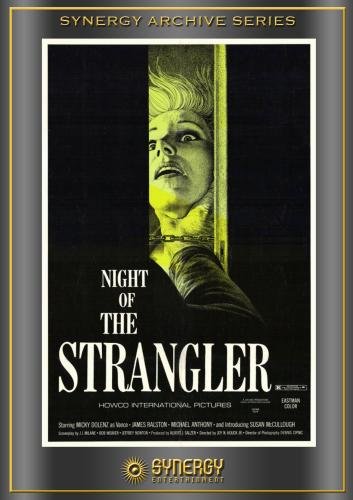
THE NIGHT OF THE STRANGLER
US, 1972, 88 minutes, Colour.
Mickey Dolenz, James Ralston, Michael Anthony, Chuck Patterson, Susan Mc Culloch, Katie Tilley, Anne Barrett, Harold Sylvester.
Directed by Joy N. Houck Jr.
The title of the film bears no relationship to the screenplay nor any of the murders that take place. There is a variety of drowning, wrist-slitting, snakebite, shootings… If anyone comes across this film, and it is available on You Tube, it is a very small-budget pot-boiling thriller set in New Orleans.
It was released in 1972 and it is interesting in its treatment of African- Americans in the American South. And one of the main characters is a priest, a black priest in something of a prejudiced white community; another of the main characters is one of the New Orleans police force. It is not yet a decade after the March on Washington and Civil Rights legislation, but the African- Americans seem to have a proper place in New Orleans. However, the word ‘nigger’ is used frequently, as a matter of derision by racist whites, and with tongue-in-cheek humour by some of the black characters themselves. To this extent, along with the surprise of hearing the word nigger so often, it is an interesting picture of the times and race issues.
What is particularly interesting is the character of the priest. We first see him returning from a year-long retreat in a monastery, is welcomed back to the Archdiocese, being given back his previous parish. The Monsignor who welcomes him back refers to the parable of the Prodigal Son, referring to the status of the two brothers, the repentant brother and the one who stays and begins to hate his father. The bespectacled priest has returned, speaks well, seems a very decent priest, wearing his cassock in the street, lives in a rectory with plenty of Catholic iconography and is welcomed back to the school as well.
The priest, Jesse, hears confessions, kisses and folds his stole, has achieved much as he walks through his parish? The other priest in the parish urges him to meet people and make re-acquaintance, especially with the Robert family who have suffered a tragedy. Jesse is praised for what he is doing the parish. He makes friends again with Vance (Mickey Dolenz of the Monkeys) and visits his older brother, Dan, who goes through the motions but is particularly racist and uses the word nigger frequently. At one stage, Dan angrily criticises Jesse, no black man or what is going to defame his church. He says Jesse is not just a nigger, is a black man, and niggers are not men, let alone men of God. Jesse sends flowers to Dan’s bride, but there is a poisonous snake concealed in them. Jesse gives her the last rites, then officiates at Vance’s and his fiancee’s wedding (strangely no witnesses present).
But here comes the spoiler. After admiring Jesse, who could be seen in the tradition of Bing Crosby and other genial parish priests, we suddenly discover that it is not Jesse at all. It is Jesse who has made Denise Robert pregnant and has been shot by a hitman employed by Dan. The priest is actually Jesse’s brother who had served in Vietnam, resented the death of his brother, and has decided to kill all the members of the Robert family, the brothers, their wives. Suddenly he takes his glasses off, is using slang, helluva shot, the man blasted his ass off, Nam was no picnic …
So, after being offered the portrait of a sympathetic priest, kind, pastoral, seemingly meticulous in his ministry, we discover that this is a bogus priest – and the real priest is not exemplary either. The bogus priest explains that he went away for a year to the monastery to learn all the right moves, which he was particularly good at, and a good priest.
An interestingly offbeat priest portrayal for US 1972.
Published in Movie Reviews
Published in
Movie Reviews
Tagged under
Saturday, 18 September 2021 19:55
13th Day, The
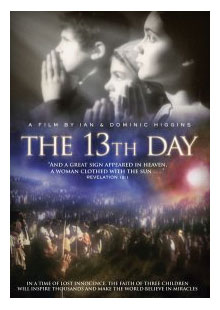
THE 13th DAY
110 minutes, Black and white and Colour.
Filipa Fernandez, Jane Lesley, Michael D' Cruze, Tarek Merlin.
Directed by Ian and Dominic Higgins.
This is a film about the experience of the three young children, Lucia, Jacinta and Francisco, who had visions of the Blessed Virgin Mary in Fatima, Portugal, in 1917.
Another film about the apparitions was made in 1953, The Miracle of Our Lady of Fatima, directed by John Brahm. It was quite a devout film in the vein of The Song of Bernadette, made ten years earlier. The Fatima film is not in the dramatic quality of The Song of Bernadette. In 1953, with the Mc Carthy hearings, the blacklist and a strong anti-Communist atmosphere in the United States, the Fatima film was strong in dialogue critical of Communism.
The present film, released in 2009, retains the atmosphere of anti-communism, commenting on the Bolshevik revolution of 1917, the spread of world communism, the consequences for the world and the atheistic communism and persecution of the church.
The film was made for video release, especially to devout audiences who were comfortable with the language of devotion and piety. In does not play well to those who don’t share the faith perspective or the piety perspective.
The film opens with the older girl, Lucia, in a convent in Spain in 1937, asked to write her memoirs. The sequences recur throughout the film, with the film ending looking directly at Lucia.
The action of the film is principally in flashback. Most of the film is made in black and white, with special effects for colour pervading some of the sequences, especially with the presence of the Blessed Virgin Mary, colour for the three visionaries, on some of the thousands who gathered to witness the children and their apparitions, but, especially the famous dance of the Sun on October 13, 2017. The writers and directors of the film, brothers Ian and Dominic Higgins, were also in charge of these special effects. This makes the experience of the film more striking than it might have been.
The rest of the film is fairly conventional, one of the mothers being very hostile to the idea of her child having visions while the father is sympathetic. There are some moments with the parish priest, his interrogations, his questioning and disbelief – and his later being surprised at the effects of the apparitions.
There is great emphasis on the political atmosphere of the time, especially in Portugal and its anti-clerical government, the response to the apparitions and the internment of the children, the crude death threats, the fear of people’s reactions. There are glimpses of the Bolshevik revolution and so the attitudes of the times, very wary of communism, after the war.
The spirituality of the apparitions is rather grim, an offended God, suffering for saving the souls of sinners.
The apparitions continued monthly from May to October, 1917. Lucia lived until the year 2005. Jacinta and Francisco succumbed to the influenza epidemic after the war.
1. The audience for this film, believers, Catholics, the devout?
2. The black-and-white photography, celebrates silhouettes and posed scenes? Idyllic? The transition to colour, for the apparitions, for Mary, the children? The miracle of the Sun?
3. The voice-over, Lucia, 1937, her writing? Her introducing the other two children, the ideal description of them?
4. The background World War I, the Bolshevik revolution, anticlerical government in Portugal?
5. The children out of the hills, playing, the storm, the stillness of the air, the mission? The lady, talking about suffering, saving sinners, the children’s willingness to do this?
6. Response of the parents, the mother thinking it was the wrath of God? The sympathetic father?
7. The parish priest, the interrogation, the children not revealing the secrets? The later challenge to his attitudes?
8. The torment of the children, the populace, at school, considered a witch, the children’s response to save souls?
9. The return to the apparitions, the crowds? Journalists? The authorities and their response?
10. July, their being interned? The ground splitting, the colour version of the fires of hell?
11. Mary, the immaculate heart, wanting a consecration of Russia to the immaculate heart? That the Pope was to suffer – the visual of the Pope?
12. The accusation that the children were making up fairytales? In their internment, the crass threats of death, boiling oil? The other prisoners, praying the
rosary?
13. October, the people critical, the dancing Sun? The effect on people?
14. The secrets, and spirituality of God being angered, Mary’s tender sorrow, parents and reparation?
15. The value of having this kind of dramatisation of the experience of Fatima?
Published in Movie Reviews
Published in
Movie Reviews
Tagged under
Saturday, 18 September 2021 19:55
Space Station 76

SPACE STATION 76
US, 2014, 93 minutes, Colour.
Patrick Wilson, Liv Tyler, Marisa Coughlan, Matt Bomer, Jerry O' Connell, Kylie Rogers, Kali Rocha.
Directed by Jack Plotnick.
It is not always easy to see what kind of film this is. It is set in a future with space stations all around the galaxy, some for observation, some for repairs, some transit stations, a world in which some of the characters have lived only on the space stations and have never visited Earth. What seems like a space story (even having 2001’s Keir Dulea in a cameo as the heroine’s father) turns into something of a space soap opera.
With a range of characters at the station, there is enough melodrama, with comic touches in dialogue, for a space operas series.
The captain of the ship, played by Patrick Wilson, is a neurotic loner, smoking incessantly, playing idly with the various tabs on his console, not particularly happy when a new assistant, Liv Tyler, arrives and seems to know more about the ship than he does and is continually offering constructive comment which he declines. It soon emerges that he was in a relationship with one of the crew who has since left and has been promoted on another station. He doesn’t see himself as gay. He does go to the robot who is the alleged counsellor on board and, after some discussions, realises that the robot is programmed to respond, often with cliches or, at best, proverbs, to verbal keys. The captain contacts his former lover who speaks in exasperated way about the attempt to get him drunk, sexual approaches, and his having to leave, in a new relationship with arrival captain. At the Christmas party, where secrets are being revealed, it is made clear that everybody knows that he is gay. After the party, he encounters another man on board which means he may have some future.
Liv Tyler is Jessica, an expert, never having been to earth, confiding in Misty, the mother of the little girl, Sunshine, on the station and Misty’s husband. Ted, a mechanic, that she is unable to have children. Misty is to keep this secret. In the meantime, Jessica makes friends with the little girl, helping her with her gerbil, making Misty very jealous, accusing Jessica of manipulation, something that Misty herself is most capable of. Ted, in the meantime, has sexual images, fantasy of a naked woman appearing to him. He is also attracted to Jessica. One of his difficulties is that he has an artificial hand, having shot off his hand in his first week of repair work, not in any major battle.
Donna is an aristocratic type on the station, with the child, and with a husband, Jerry O’ Connell, with a roving eye.
Life in the station can be very artificial, preparing evening meal simply by pressing buttons, pressing another button to get prescriptions of Valium, television screens in rooms so that Sunshine can see the squabbles of her parents.
Finally, there is a Christmas party where Misty suggests everybody tells a secret, revealing that she does not love her husband, that Jessica is unable to have a child, which means that everybody becomes involved, including the revelations about the captain.
Something of a tongue-in-chick comment about society, no matter where. Something of an oddball film experience.
Published in Movie Reviews
Published in
Movie Reviews
Tagged under
Saturday, 18 September 2021 19:55
Underground/ 1941
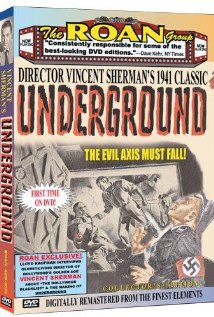
UNDERGROUND
US, 1941, 95 minutes, Black and white.
Jeffrey Lynn, Philip Dorn, Kaaren Verne, Mona Maris, Martin Kosleck.
Directed by Vincent Sherman.
In retrospect, it is surprising to find that this film dates from 1941, early in World War II and produced before the bombing of Pearl Harbor. It is a small melodrama, focusing on the underground resistance in Berlin at the outbreak of the war.
Philip Dorn portrays Eric, a scientist, who is the leader of the underground, with its illegal broadcasts. His younger brother, Kurt, played by Jeffrey Lynn, is a wounded veteran of the war, very loyal to the state. He makes contact with a friend of his brother, a violin player, Sylvia, played by Kaaren Verne. She is also involved in the underground. The screenplay focuses on the preparations for a broadcast, the tracing of the broadcast by the Gestapo, its destruction, the police following leads and releasing a prisoner tortured for several years who may lead them to the rebels.
Kurt becomes more involved with Sylvia, cannot believe that she is part of the underground, and finally, unwittingly, betrays his brother to the authorities. Disillusioned by the torture of prisoners, including his father, he agrees to be the voice of the underground after his brother’s death.
The screenplay is quite straightforward in its condemnation of the Nazis, and speculates about the reason for Rudolf Hess going to the UK – interpreting this as going to the allies. Martin Kosleck plays a credible cruel Nazi.
The film was an early direction piece by Vincent Sherman, who was hindered by the blacklist and his association with actor John Garfield, but who made a comeback directing many television programs.
1. A war-time film? Dramatisation of the Berlin underground? Propaganda against the Nazis?
2. The studio work, re-creation of Berlin, of homes, cafes, Nazi offices, torture rooms? The musical score?
3. Audiences looking back at World War II, German supremacy, resistance? This drama released for years before the end of the war?
4. The presentation of the Franken and family, Eric at home, his skilful work as a scientist, his relationship with his brother, the relationship with Sylvia? The revelation of his work with the underground, Sylvia and the associates, fixing the radio, the broadcast itself, the criticism of German society and of the Nazis?
5. The members of the underground, their work, cover, meetings and codes, secret meeting rooms? The woman working at Gestapo headquarters? Communications, warnings? The member imprisoned, tortured for two years, released, his leading the Gestapo to the cafe, Eric and his friend confronting
him, leaving the gun, he shooting himself?
6. Kurt, wounded, the loss of an arm, the response of his mother and father, at home, the meal? His finding Eric’s card with Sylvia’s name? Seeking her out? The conversations? Following her? Falling in love? Going to the railway station, the mixup with the package, the radio parts? Her being arrested and tortured? Released, Kurt following her, reporting to the Gestapo every day? The courier arriving, Kurt seeing the package, realising the truth? His reports to Heller, the questions, the radio broadcast, his phoning in, not realising it was Eric, the revelation? His trying to save Sylvia?
7. The presentation of the family, ordinary Germans, loyal to the state? The neighbour and the death of his son, anti-Nazi expressions? The arrest of the father, the testimony of the maid about the speech against the State? Her being terrified, confused?
8. Sylvia, playing the violin, her work, the friendship with Kurt, with him, the episode of the railway station and the bag, the discovery of the truth? His saving her?
9. Eric, not suspected, working in the laboratories? The second broadcast? The arrests, his torture? Being brought in, Kurt saying that he betrayed him?
10. The woman working for the Gestapo, the phone calls, information, the showing Kurt his father being tortured, the effect on Kurt, her persuading him to take up Eric’s mission? His final broadcast, the quoting of the Shakespearean text and Eric going to his death knowing that Kurt would continue his work?
11. Heller and his loyalty, cruelty, his assistant and guillotine face upwards? Rivalries? Rumours about Goebbels and Himler and overseas wealth? Vicious torture?
12. Warner Brothers film, small-budget, not well-known, but in retrospect a significant film about World War II?
Published in Movie Reviews
Published in
Movie Reviews
Tagged under